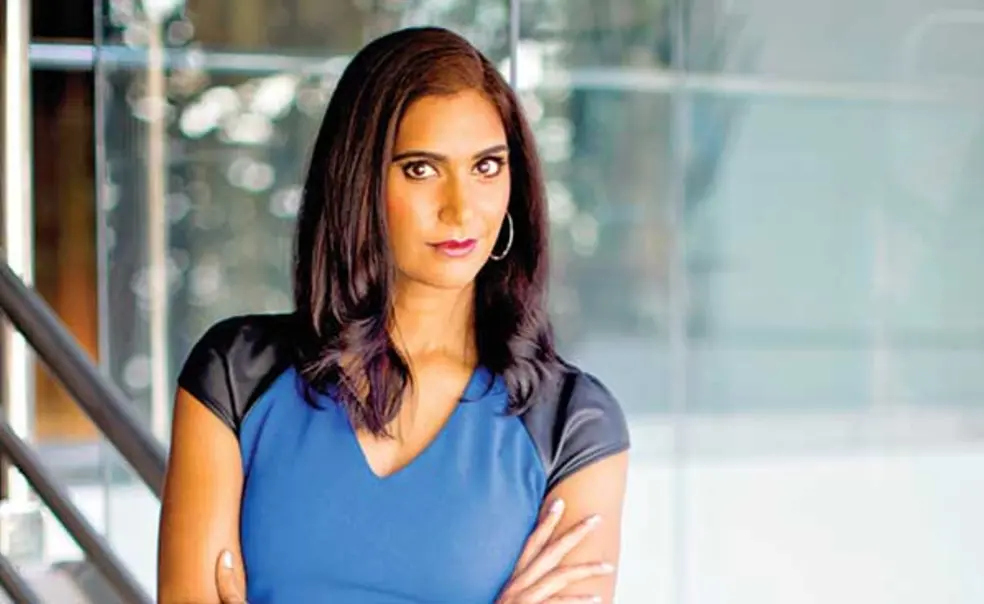Asha Rangappa ’96: Reality Checker
In a time of misinformation, an FBI agent-turned-professor has found her niche correcting the record
It was a circuitous path — from high school cheerleader to Triangle Club performer to Yale Law School-trained attorney to three years as an FBI agent — but Asha Rangappa ’96 has found a calling in the current political era: explaining the ins and outs of counterintelligence to the American public.
Rangappa is on contract as a national-security analyst with CNN; she also writes op-eds and analyzes news developments on Twitter, where she has amassed nearly 400,000 followers. With a mix of erudition and online snark, she has joined a chorus of legal and law-enforcement voices who have expressed alarm about the allegations surrounding foreign election meddling.
Rangappa grew up in the military town of Hampton, Va., a child of Indian immigrants and the only South Asian student in her school. “I was kind of exotic, but I never felt a lot of anti-immigrant sentiment,” she says. “Still, I was straddling the two worlds. My family had our own customs — we didn’t eat meat, we ate with our hands, and we spoke a different language at home.”
It was a fluke that she ended up at Princeton. “Honestly, I got a brochure in the mail, and the buildings looked really pretty,” she says. She decided to major in the Woodrow Wilson School and minor in Latin American studies. Rangappa’s research focused on the drug trade; she spent a summer working at the State Department’s Colombia desk and later won a Fulbright scholarship to that country.
“We’re in such a tribal society now that to stand for principles like rule of law ... means that, de facto, you are seen as being on the other side.”
Asha Rangappa ’96
Rangappa earned her law degree in 2000 and, after getting to know some FBI agents as an intern in the U.S. Attorney’s Office in Baltimore, applied to the bureau. Not only did she think it would be more interesting than joining a law firm, she also found the idea of government service appealing. “I don’t want to get too touchy-feely about Ronald Reagan, but his rhetoric was about a shining city on a hill,” she says. “I internalized that.”
Her FBI application languished until 9/11, when the bureau found itself in need of foreign-language speakers. Rangappa’s skills in Spanish and Kannada — an Indian language spoken in and around Bangalore — piqued the FBI’s interest in her, and within nine months, she was on board.
Shortly before her physical training started, Rangappa was in a car accident that left her with injured ribs. “I failed the test spectacularly,” she says. “I didn’t have a lot of support. My parents thought I was nuts, and my law school classmates thought I was crazy.” But she doubled down, getting up at 4 a.m. to wrap her ribs and train; eventually, she passed her physical and shooting tests. Rangappa can’t discuss most of her work as an agent, but she did tell Elle magazine that she once surveilled a foreign-intelligence target while pretending to be on a date, a wire hidden in her purse.
At 31, Rangappa left the FBI to become dean of admissions at Yale Law School. She remained in that post for 12 years before moving to Yale’s Jackson Institute for Global Affairs, where she handles admissions and teaches national-security law. However, she’s best known as a talking head and active Twitter user.
This phase of her life began when President Donald Trump tweeted in early 2017 that President Barack Obama had wiretapped him. “I said to myself, ‘This is impossible! I know how this stuff works,’” Rangappa says. So she wrote an explanatory article about the Foreign Intelligence Surveillance Act, and cable networks began bringing her on as an expert. Her appearances accelerated after Trump fired FBI Director James Comey, and Robert Mueller ’66, former director of the FBI, was tapped as special counsel to investigate Russian meddling in the 2016 election.
Rangappa feels strongly about the need for Congress to fully investigate the allegations against Trump. “I believe in the process. He may never be convicted in a trial, but I do think there are important principles to stand up for,” she says. Still, she understands why the whole matter seems to make many Americans’ eyes glaze over. With the investigation of Russian election meddling “things got very complicated very quickly. It became a Tolstoy novel,” she says. “Scandals stick when they’re simple.”
One particularly depressing trend for Rangappa is the effort to reject unfavorable news as biased. “We’re in such a tribal society now that to stand for principles like the rule of law or to defend democratic norms means that, de facto, you are seen as being on the other side,” she says.












1 Response
Lawrence Cheetham ’67
6 Years AgoCNN Ties Raise Questions
Good that Princeton in the nation’s service included Asha Rangappa ’96, an erudite alumna who served with the FBI for five years (Princetonians, Oct. 23). Excellence is needed at all levels of law enforcement and the military. But when I read her comment about President Trump’s assertion that he had been wiretapped (“This is impossible! I know how this stuff works”), I paused to regroup. What did she make of the May 16, 2017, story in The New York Times subtitled “Trump Campaign Wiretapped”? Or the imminent inspector-general’s report on FISA warrants that facilitated surveillance on Donald Trump?
How does a Princeton education morph into an alignment with CNN as a paid national-security analyst with scant awareness of countervailing news? But then her final observation — about the depressing trend of efforts to reject news “as biased” when viewed as unfavorable — is more an indictment of her colleagues in national news and CNN’s daily negative prattle, isn’t it?